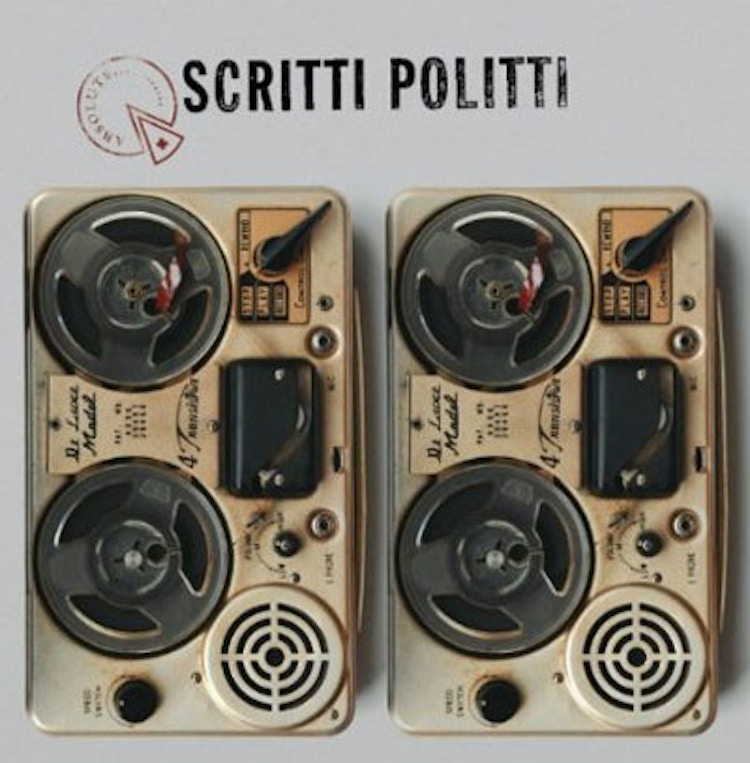"Absolute"

How did one shy, Welsh intellectual with a passion for Marxism and Deconstructionist theory convince Mos Def, Miles Davis and Robert Wyatt to appear on his records? Simple: write some of the most beguiling, fascinating pop songs of his era. Green Gartside, the brains behind Scritti Politti, is often mentioned alongside such eighties cult genii as Kevin Rowland or Paddy MacAloon; yet, while Rowland had dungarees and the great Irish writers, and MacAloon wrapped himself in “the songs of Georgie Gershwin”, Green lived for Roland Barthes, Jacques Derrida and the Top 40 – a singular mix that makes Absolute a wildly varied listen, but always an exciting one.
As the only artefact from their speed-fuelled commune-dwelling days, Scritti’s 1978 debut ‘Skank Bloc Bologna’ is the most obviously out of place thing here; built around as jagged and anaemic a guitar line as ever emerged from the post punk era, it sounds at once distinctly of-its-time (especially the pseudo-Weller sneer in Green’s vocals) and completely timeless – not even PiL grooved like this. The lyrics, when intelligible, are even more confounding, with distinctly punk references to supermarkets and teatime colliding with a rock-solid manifesto: “They’re working on a notion, and they’re working on a hope – a new world vision in a skanking scope.”
Ironically, Green realised that he was his own muse just as his band left The Me Decade; Scritti’s best songs (most of which are love songs) are less aimed at the opposite sex than the singer’s own notions of love and sexuality. 1988′s ‘Oh Patti (Don’t Feel Sorry for Loverboy)’ is a case in point; it’s Scritti’s finest ballad, and one of Gartside’s most impressive lyrics, but if Green cared about Patti as much as he insists, he would have let her be the subject of the song’s shimmering chorus rather than his doomed ‘Loverboy’. You just hope Miles Davis’s gorgeous, if confounding, trumpet solo was consolation enough for his one-time girl. Meanwhile, the glorious gallop of ‘Asylums in Jerusalem’ boasts another example of Green’s mythmaking, with its central plea – “Let him pop a little, let him swing, ‘cuz he is sorry” working as post-breakdown statement of intent-cum-apology to the Politti hardcore. ‘The Word Girl (Flesh and Blood)” is even better – one of the all-time great eighties pop songs; a loping reggae beat cushions Green’s most irresistible melody, which carries what can only be described as a love song to semiotics. You never got that from Simon Le Bon.
Meanwhile, 1999′s Anomie & Bonhomie – often cited as Gartside’s tribute to ghetto culture, but really no less eclectic an effort than any other Scritti record – may be represented here by its more rap-heavy tracks, but in this new context, its tracks stand out even more; ‘Tinseltown to the Boogiedown”s unique take on hip-hop remains perfect, while the Disney strings and naked sincerity of ‘Brushed With Oil, Dusted With Powder’ make for a beautiful oddity in the band’s catalogue. Best of the lot is the flawed genremelding of the suitably-titled ‘Umm’: dub intro? Check. Glistening janglepop verses? Check. Metal chorus? Check. Hip hop breakdown? Check! Its lyrics, meanwhile, further fuel the Green myth, cataloguing his decade out of the pop game, having been stricken by his status as – to cop a phrase from a great academic (read: Simpsons writer) – “a street smart fish out of water in a world he never made,” and are positively stuffed with Gartside’s most insightful introspection: “I’m cutting down on the stuff I’m thinkin’ – too much ‘umm’ drives a man insane.”
Absolute is touted as “Scritti Politti’s first career-spanning compilation”, but that’s not quite true; although all of the band’s Virgin singles show up, there’s still no room for anything from 2006′s Rough Trade-released White Bread, Black Beer – not even the classic ‘The Boom Boom Bap’ – and since tracks from the band’s first stint with Rough Trade appear, it can’t be a mere licensing issue. Even more confounding is the album’s thoughtless running order, which clumsily clumps tracks from each respective album together. Opening the album with five tracks from the band’s biggest success, Cupid and Psyche ’85, makes sense in theory, but the painfully dated production of its songs might alienate a few new listeners. Then again, the two new Scritti tracks which close out the album sound as current in 2011 as ‘Perfect Way’ must have done in 1985, suggesting that Green still keeps an ear to the charts. ‘A Place We Both Belong’ is a slinky slab of R&B, but co-writer David Gamson’s more recent production work with Ke$ha and Adam Lambert must have informed the brilliant ‘Day Late and a Dollar Short’, which sees Green dabble with Autotune and Beach Boys harmonies, and bounces along hard like Pink’s inescapable, irritating, yet strangely wonderful ‘So What’. If it were handed to any of today’s interchangeable starlets/harlots, it would be a stratospheric hit, but after one listen, you won’t want to hear it sung by anyone else. I mean, Green always was the thinking person’s pop star, and in their prime, Scritti Politti always were a band to live your life by.
RECOMMENDED.
once the band left ‘The Me Decade’
Get the Best Fit take on the week in music direct to your inbox every Friday

Emma-Jean Thackray
Weirdo

Viagra Boys
viagr aboys

William Tyler
Time Indefinite





